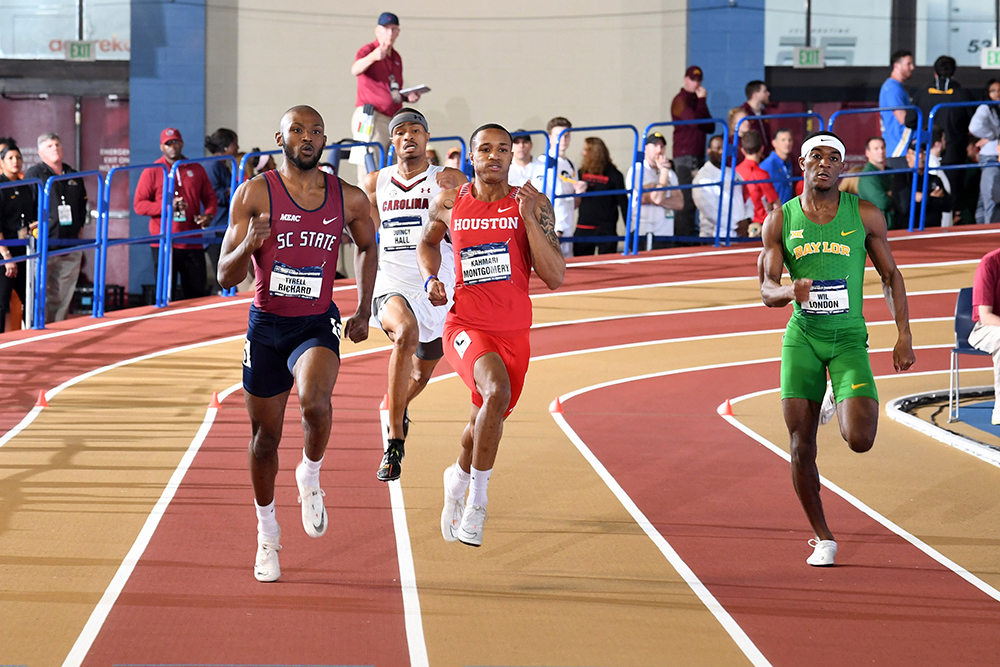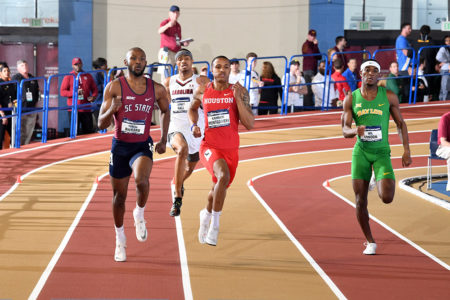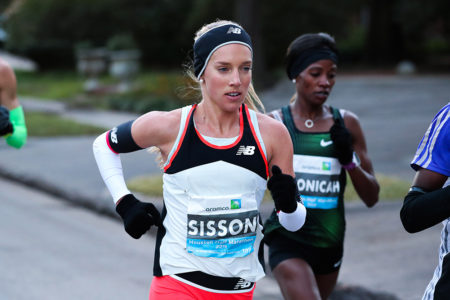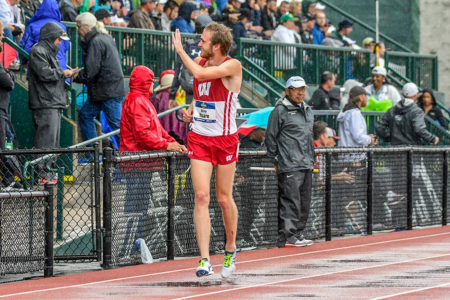
ON APRIL 5 at the North Florida Invitational Tyrell Richard of South Carolina State unreeled a 44.81 season opener for a yearly world leader. He won by nearly 20m. Eight days later at the Gamecock Invitational South Carolina’s Quincy Hall produced a 44.53 to take that global list-topper away from his in-state competition. The two speedsters, who train not even 50M away from each other—Richard in Orangeburg, Hall in Columbia—have only ever raced once. That encounter came at the NCAA Indoor, where Richard won in 44.81. Hall finished 4th in the same section in 45.25.
Richard Took A While To Warm To Track
Maybe a few fans noticed Richard becoming a blip on the track radar with a string of solid 400s last season, topped by his 44.70 PR in the NCAA semis. He followed that with a 45.10 for 5th in the final, running a lane to the inside of Michael Norman’s 43.61. (“He rocketed out of there. I wasn’t expecting that.”) But if you never noticed Richard’s name before that, the track gods forgive you. You see, for the longest time he had no intention of being a track star. “I wasn’t passionate about track,” he admits.
Football, maybe. He came from a football family. His older brother Donovan set SC State’s record for most career tackles and later made the practice squad for the Jacksonville Jaguars before playing in Europe. Tevin, the next brother, also played for the school, setting a single-season record for the most blocked kicks. So when Bulldog track coach Tim Langford recruited Richard, who had placed 2nd in the 400 in the South Carolina 1A meet in 48.35, he did it by offering him a combo football/track scholarship. Once in Orangeburg, Richard sat out of football for a year, then found out that the football team didn’t have the funds to take care of him. “When I realized football was not going to put anything toward my scholarship, I decided to go fully track,” he says.
“Fully” does not mean the same thing as “committed.” As a frosh, Richard had a best of 47.27. He finished 7th in the Mid-Eastern Athletic Conference. The next year, he improved to 46.41. That made him the conference’s runner-up. As a junior, however, something clicked. At the MEAC, he produced PRs in both the heats (45.50) and final (45.21), in addition to a windy 20.53 for 2nd in the 200. And the hits kept coming all the way through the NCAA final. But, says Richard, “If you had asked me if I wanted to run track professionally, I would have said, ‘Probably not. I don’t care.’”
He went to the USATF Championships, where he managed just 47.43 in his heat. “I was really ready to get it over with,” he says. Having an internship lined up for the summer, he simply wanted to get on with his life. “But something sparked in me, coming back to school in the fall, that made me really want to do this right,” he says. “Now if you ask me if I want to run professionally, I will tell you that it’s something that I’m going to do.”
Focused on winning the NCAA title outdoors after his indoor triumph, the 21-year-old Richard says he “absolutely” has plans to be at USATF, fighting for a spot on the World Championships squad. “I’m new,” he adds. “I’m just getting all in it, so be ready for some big things.”
Hurdles Or Flat For Hall? Or…?
Up the road, Quincy Hall is also eyeing an NCAA crown and a Doha berth. The question for him is, in which event? Gamecock coach Curtis Frye recruited him out of California’s College of the Sequoias where Hall had established solid credentials at 1 lap, both with and without hurdles.
As a frosh he captured the ’16 Pan-Am Junior gold in the 400H in 49.02. Earlier in the season his 45.12 won the Mt. SAC Relays 400. As a soph he went undefeated in the hurdles (best of 49.65) and blistered a 44.60 in the 400 to win the Sun Angel Classic by 0.02 over Paul Dedewo, who went on to rank No. 3 in the world.
Hall says nothing about his recent 44.53 surprised him: “It was just a good day, I guess.” At 20 a year younger than Richard, Hall has far more experience in the sport, his résumé dating back to age 5, when he specialized in racing his cousins in the neighborhood. His church put together a track team, and his path was set. Going to South High in Raytown, Missouri, he had bests of 46.82 and 37.40 for the 300H, winning two State titles on the flat.
Now a legit threat in both varieties of the 400, Hall knows he will have to make a choice. At the NCAA, the hurdles are a mere 25:00 after the flat final. At USATF, the hurdles will be first, with the 400 just 18:00 later. “They’re back-to-back,” he sighs.
His leaning? “Before, I actually was thinking that I was more of a 400 hurdler, but I’ve surprised myself in the 400,” he says. “I’m kind of leaning towards the 400 now… but I’m still wanting to do the 400H. They’re still equal.” For the collegiate season, he notes, “I think I want to focus on the 400H more for the rest of the year, until the SECs.”
Then comes the long break—48 days in his case—from the NCAA meet to the USATF. “We’ll take some rest after, but not too much rest; we’re still practicing. The practices would not be so intense and then we get back to intense 3 weeks before. You know you’ve got to run again.”
Hall is not going to let his heart decide which event he will try for in Des Moines. “It’s going to be more where I sit on the lists,” he says. “Whatever’s my best chance of making the team, you know?” As to which event he will eventually make his name in, he’s not sure. Coach Frye, he notes, “mostly says hurdles, but he’d like to throw a halfmile in there.” Hall ran a 1:51 on the first day of practice. “I know I can go faster than that. I’m more in shape now. I think I can go at least 1:47 or 1:46.”
Not this year, though. His dance card is full. “If I do come back collegiately, [the 800 debut] will probably be indoor,” he says. Right now, he’s all about a single lap, with or without hurdles.






